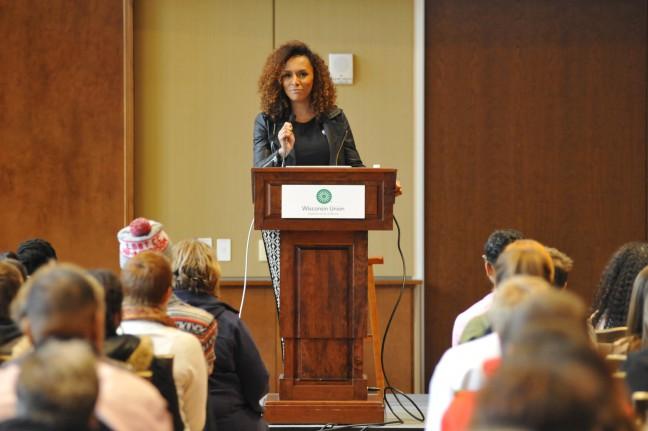As an activist, a leader and an advocate, Janet Mock took her audience through her journey of self-acceptance in a talk on campus Wednesday, telling students to stay true to their identity.
Mock, the New York Times bestselling author of “Redefining Realness: My Path to Womanhood, Identity, Love and So Much More” and a transgender woman, was the featured speaker at the Distinguished Lecture Series for the LGBT Campus Center’s Out and About Month at Union South.
Mock was born the middle child with four siblings and raised in Honolulu. A first generation college graduate, she said her journey as a young person was defined by her efforts to try to be herself in a culture that did not acknowledge or accept her true identity.
“In high school, some of my most pivotal moments rose from pop culture. I saw Beyoncé in TV. Things touched me. I was not represented in the media, but Beyoncé validated me. She is the epitome of a graceful, talented, strong, hard-working woman, who was the role model for me,” Mock said. “She made me love being brown.”

A pivotal moment in Mock’s journey was in 2001 while watching footage of the World Trade Center burning down after 9/11. In that moment, she said she realized she did not want to die before she got to be her true self.
Mock said she decided to tell her story to Marie Claire in 2011. Her decision came from her desire to show people how transgender women express their identity and share themselves with the world, she said.
“I wanted to help advance social and racial justice, advance social identity of trans-women of color, who is struggling with lower income discrimination,” Mock said. “I want to tell people their struggles and their triumph.”
Mock shared some of the context regarding violence against transgender women by sharing the stories of Sylvia Rivera, a 1970s activist, and Monica Jones, a transgender woman arrested under false pretenses.
She said she wanted to let people know struggles with unemployment, a lack of healthcare and education pushed trans-women into an underground economy. They are hard to be profiled because society doesn’t acknowledge the fact that their body and identities are valid, Mock said.
Fifty-three percent of anti-LGBTQ homicides are transgender woman, Mock said. As an out-spoken, visible trans-woman, Mock said these figures acted as motivation for her to dedicate her work to address the issues in transgender woman society.
Mock said she wants to have the ability to use her words to help other transgender women and let people see the challenges and struggles that are present in the community of transgender women.
“It’s time to end the stigma, we are exactly who we say who we are despite what our culture say it is. It’s vital we use our stories and experiences to uplift the names and voices of trans-women of color,” she said.



